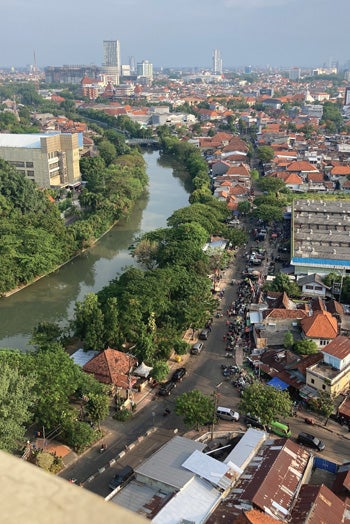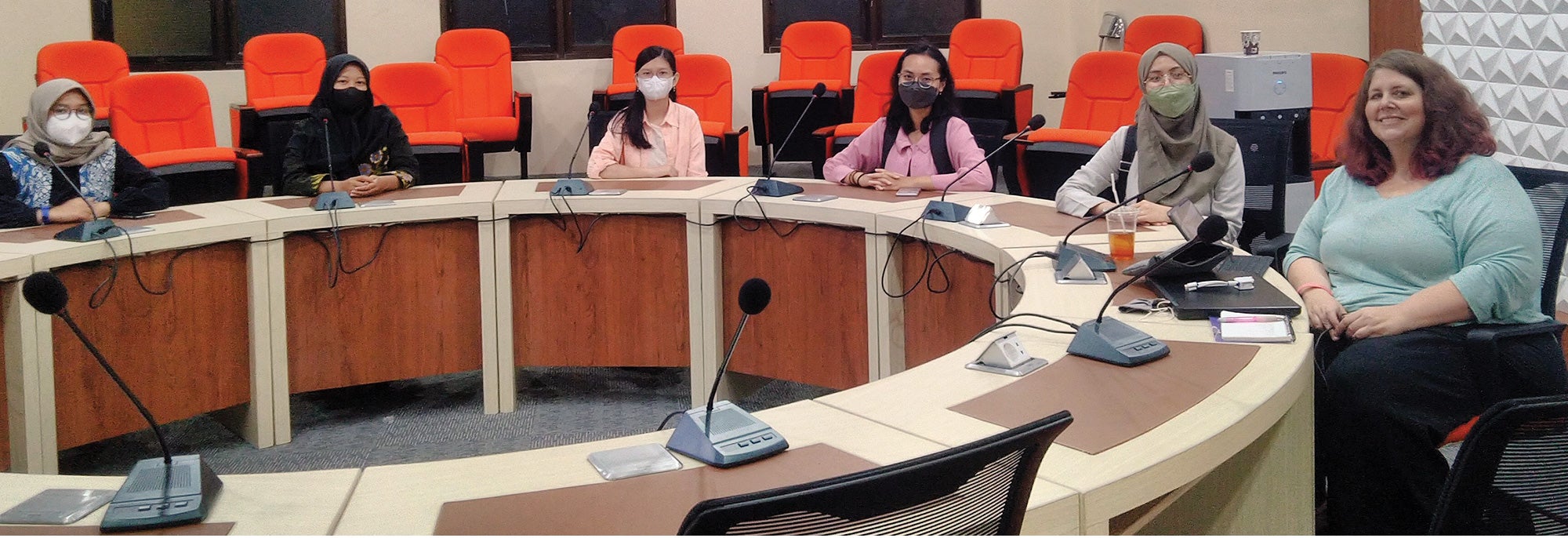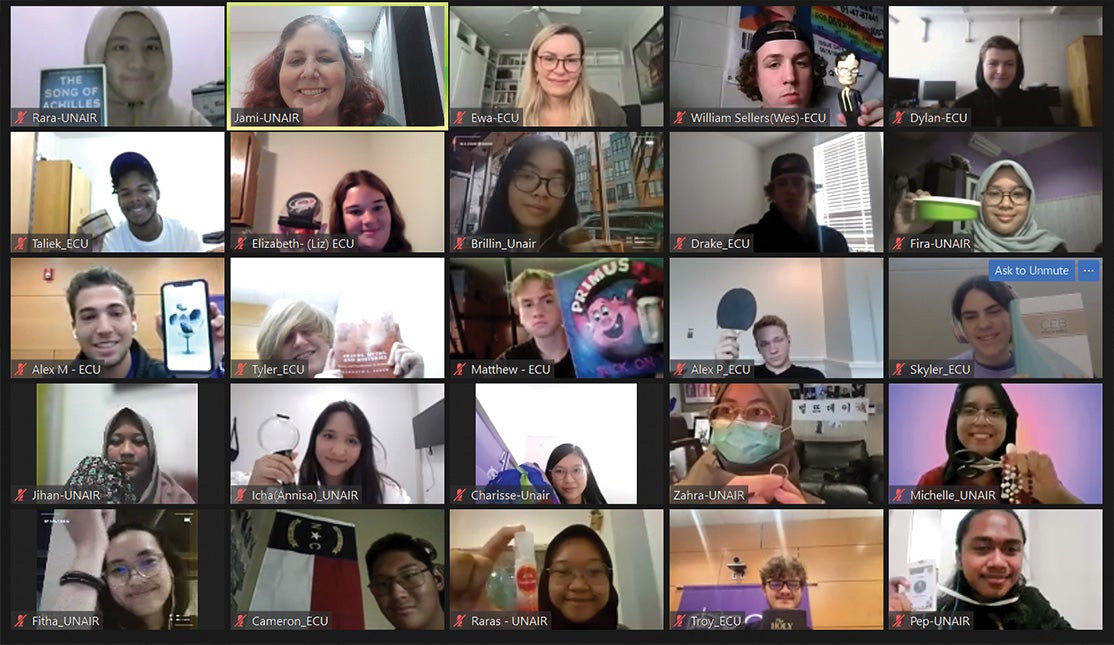Each year almost 500 students at East Carolina University connect, engage and collaborate with students at more than 50 universities around the world, learning about their cultures and collaborating on projects — without ever leaving Greenville.
Long before Zoom, Skype and other video calling platforms were readily available or a pandemic made remote work and learning ubiquitous, Jami Leibowitz, associate director of global affairs, and ECU became pioneers in the field of virtual exchange. ECU established and leads Global Partners in Education, a member organization of institutions that offer at least one GPE course each year, building intercultural communication and collaboration skills through real-time interactions with partner institutions across the globe.
“Many of these students would never have otherwise been able to have these types of amazing, life-changing intercultural experiences, and a considerable number go on to study abroad or engage in other forms of international education after having these experiences in our global understanding and other virtual exchange classes,” says Jon Rezek, assistant vice chancellor for global affairs.
This year, Leibowitz was named a recipient of the Fulbright Global Scholar Award and will visit three countries to establish new virtual exchange partnerships. In the fall, she visited Universitas Airlangga (UNAIR) in Surabaya, Indonesia, helping assess and set up virtual exchange capabilities and collaborating with students back at ECU. In 2023, she’ll do the same at the Namibian University of Science and Technology in Windhoek, Namibia, in the spring and Yessenov University in Aktau, Kazakhstan, in the fall.
Leibowitz sent dispatches home documenting her experience in Indonesia. She said she has had to adapt to last-minute changes. For example, she says, about two days before the class was to begin, she was told almost half of the students would not be attending — but the university was able to find replacement students at the last minute. Most of the class is made up of students majoring in international relations.
“The UNAIR students really see the value of this type of activity and are approaching it as a rare opportunity,” she says. “Indonesia is a nation of over 1,000 islands and a nearly equivalent number of ethnic groups. However, while there is great domestic diversity, the UNAIR students have very limited contact with people from outside of the country.”
Second-year UNAIR student Ghulam Phasa Pambayung said he has not traveled outside Indonesia, and the opportunity to be exposed to a different culture has been “amazing.” Fellow student Fitha Dwi Kartikayuni has likewise not been outside Indonesia and was eager to ask American students about topics such as Greek life and tipping.
“For as long as I can remember, I have always been curious about fraternities and sororities,” she says. “In Indonesia we don’t have that kind of thing, so I can only imagine how (living with your friends) feels.”
ECU freshman Skyler Kinion is a third-generation Pirate majoring in history education with the goal of becoming a high school teacher. She’s in Ewa Silver’s history class on world civilizations, which is collaborating with Leibowitz’s class at UNAIR. Kinion was surprised to learn the Indonesian students were unfamiliar with the idea of a walkable campus.

Leibowitz took this photo from her apartment of Surabaya, Indonesia.
“At ECU it is very common to have a five-minute walk to class, and so often I see fellow students walk, but in Indonesia it is extremely less common. When discussing this with my partners they were so shocked to learn about all the walking that many students do at ECU,” she says. “I have also enjoyed learning about the food in their culture.”
For her part, Kinion was excited to tell them about the experience of ECU football and tailgating. “As someone who has grown up going to ECU games, it was so cool to share my love for the university with these students,” she says.
Kinion worked with a partner from UNAIR to create a project based on United Nations goals such as hunger, education, gender inclusion, health care and climate.
“Working on this project allows us to see that we all are inevitably facing the same issues, so we can work together, no matter the differences, to make this earth amazing,” she says. “I love talking with my partner Raras about her day-to-day life and the comparison of my own. I am so thankful technology allows us to connect with others.”
That connection has not been without issues, and the 11-hour time difference brings its own challenges, but Leibowitz was pleasantly surprised with the existing infrastructure for virtual exchange at UNAIR.
“Until just this semester, they had been teaching hybrid courses with only 50% of the students in any class allowed on campus at a time. To accommodate that, they have made all of their classrooms videoconference capable,” she says. “And, again somewhat surprisingly, most of the students have reasonable internet from home. If I had come prior to the pandemic, this would not have been the case.”
“Many of these students would never have otherwise been able to have these types of amazing, life-changing intercultural experiences.”
Jon Rezek, assistant vice chancellor for global affairs
Leibowitz noted other cultural differences, such as complete reliance on WhatsApp instead of email and the gentle hum that breaks out across the primarily Muslim city five times a day at prayer time.
“This is a city of 4 million people with no continuous sidewalks, no public transportation, and a population that hates to walk anywhere, so everyone gets around on motorbikes,” she says. “For me, though, that means a reliance on taxis. I’ve gotten very proficient with Gojek — the local version of Uber.”
Virtual exchange, says Silver, “allows students to make international connections and to learn directly from their peers in different countries. While my students will learn about different civilizations throughout the semester, they will also be able to talk and ask questions directly to students in Indonesia and Mexico about their history, way of life, traditions, religion and more.”
That thread of connection benefits the students on both sides of the exchange.
“I am sure a lot of us (the students in my university, I mean) have some misperceptions about America and its culture,” says Kartikayuni. “With this program, they will finally know how it really is like in America. We can also practice our soft skills, such as speaking in English and communicating clearly.”
Rezek says Leibowitz has established an impactful program at ECU, and recognition through the Fulbright Global Scholar Award is well-deserved.
“I am excited to bring new universities into our Global Partners in Education network and introduce new cultures to our students,” he says.


